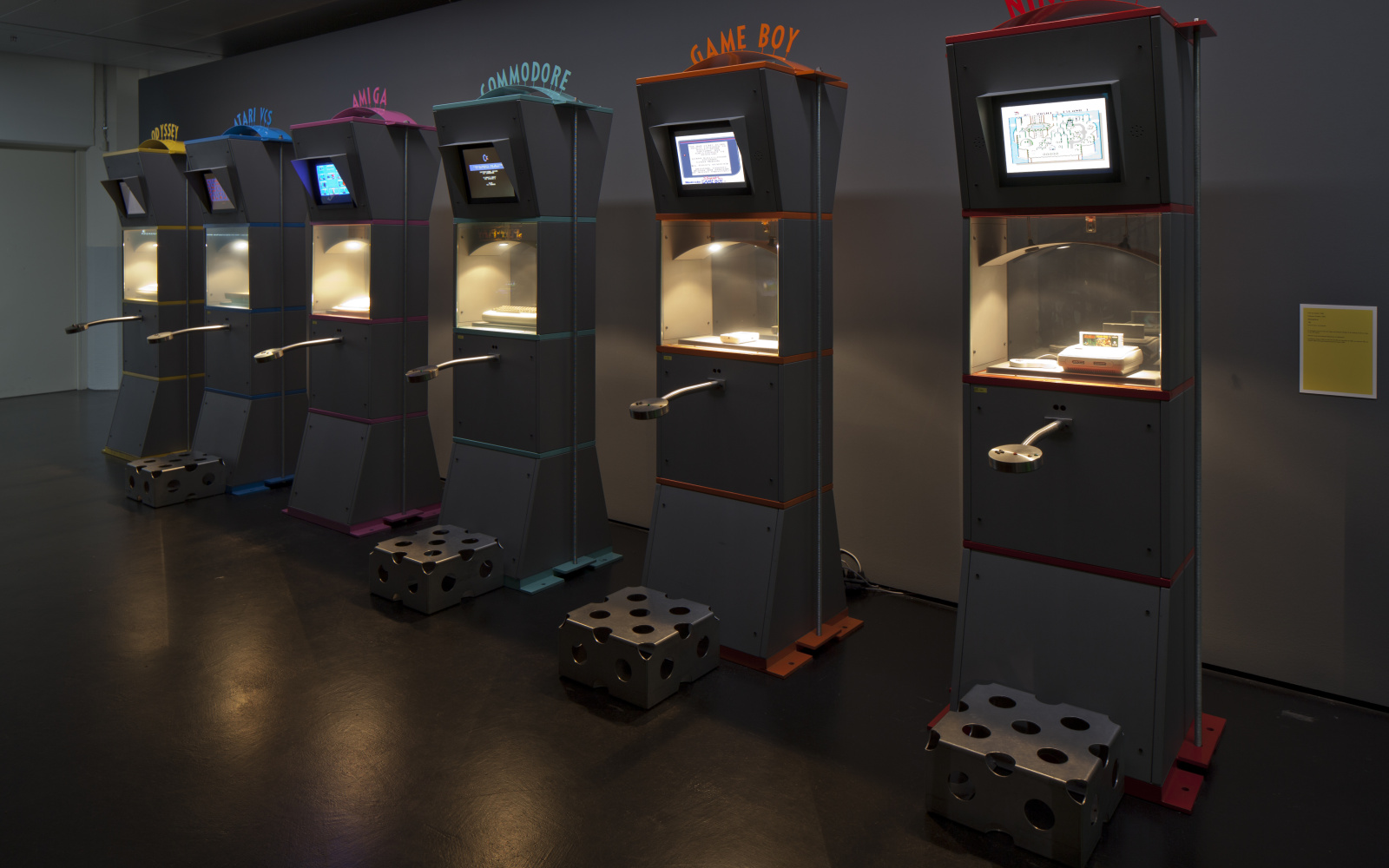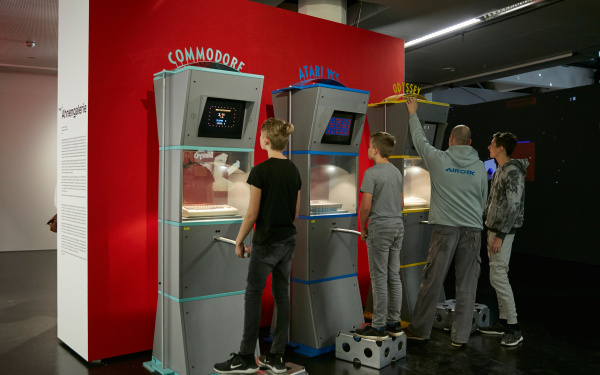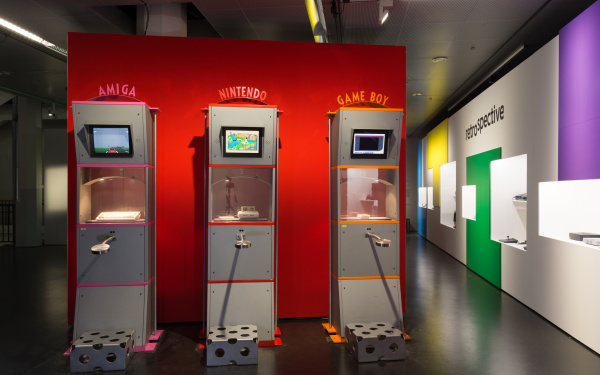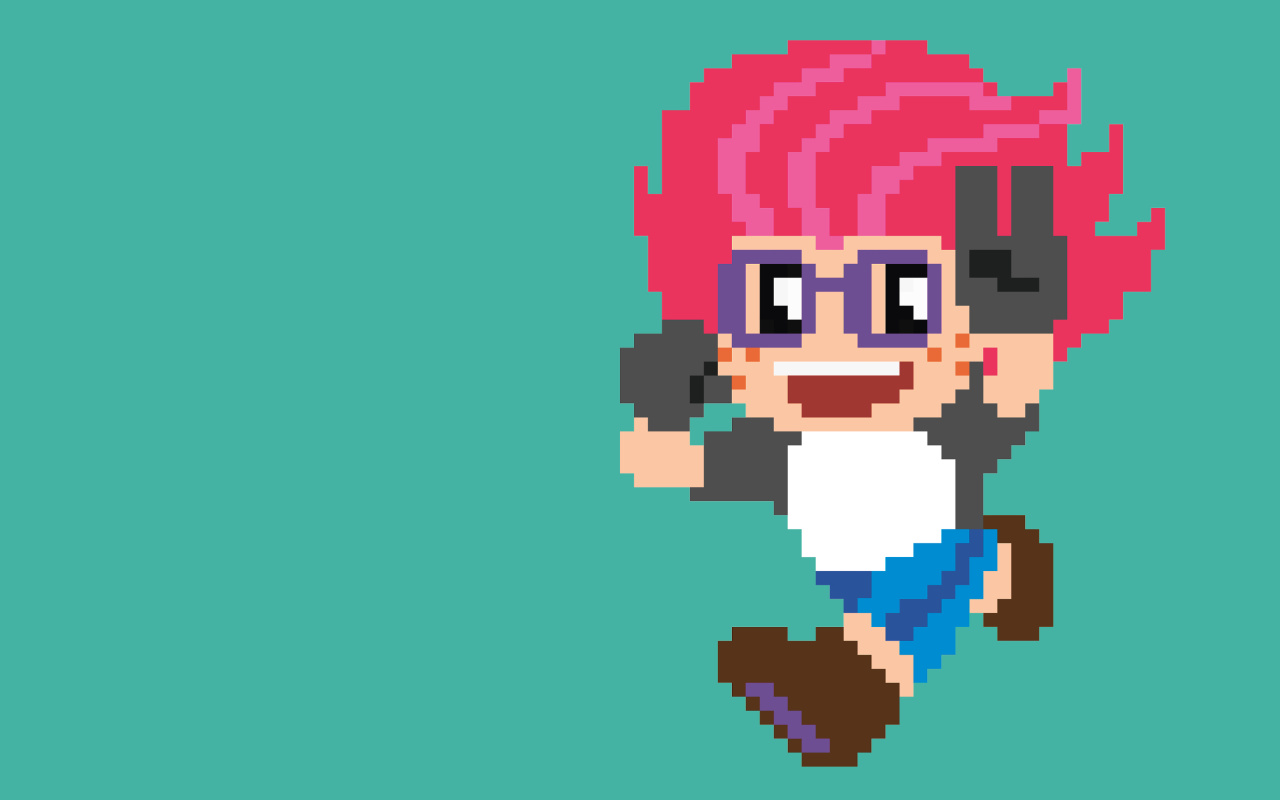Ahnengalerie
Frank den Oudsten, Friedemann Schindler – 1996
The »Ahnengalerie« tells the story of computer games with the aid of six game consoles and home computers.
Controlled by a motion sensor, the glass panes of the showcases become transparent and provide a view of the consoles and home computers.
The six stations
-
Philips Odyssey 2001 & »Pong«
In 1972 Magnavox launched the first game console ever: the Magnavox Odyssey. In the »Ahnengalerie« you can see the Philips Odyssey 2001, a later version, which was brought to the market by Philips in 1977.
»Pong« (1972) is a two-dimensional table tennis game. The aim is to direct the ball into the opponent's field in such a way that the opponent cannot hit it back. It was the first game developed by Atari.
-
Atari VCS & »Centipede«
Until the release of the Video Computer System (VCS) in 1977, Atari was famous above all as a producer of arcade machines. The Atari VCS took private households by storm and Atari became one of the first successful high-tech companies in Silicon Valey.
»Centipede« (1981) is the first arcade game designed by a woman. Dona Bailey developed the game fight against a centipede and other insects.
-
Commodore 64
The Commodore 64 (C64) (1982) is one of the first home computers that could be used for both computer games and programming. The C64 - affectionately named Bread Bin - was popular not least because of its comparatively low price and the high availability of numerous illegal software copies.
»Fiendish Freddy's Big Top O'Fun« (1990) is a sports game with special disciplines: diving, juggling, trapeze, knife throwing, high wire, and the human cannonball.
»International Soccer« (1983) is a football game.
In »Flimbo's Quest« (1990), Flimbo tries to free his friend Pearly, who was kidnapped by the mad scientist Fransz Dandruff.
In »Klax« (1990), the players have to pick up blocks and either push them onto a conveyor belt or place them in their area.
-
Nintendo Gameboy & »Tetris«
Although the Gameboy (1989) was not the first handheld console – a mobile console for on the go – it was the most successful one. Nintendo sold 120 million Gameboys. In the »Ahnengalerie« the Gameboy is presented in the form of the Super Gameboy, which was launched in 1994.
»Tetris« was developed by the Russian programmer Alexei Paschitnow in 1984 for an Elektronika 60 computer. Since 1989, the game was included as standard with every Gameboy.
-
Super Nintendo Entertainment System & »Super Mario World«
The »Super Nintendo Entertainment System« (SNES) (1990) was one of the last and most successful 2D graphics consoles. In »Super Mario World« (1990), players have to help protagonists Mario and Luigi free Princess Peach from the clutches of Mario's arch-enemy Bowser.
-
Commodore Amiga 600 & »Lotus Esprit Turbo Challenge«
In 1992 Commodore released the home computer Amiga 600, which became one of the biggest flops in Amiga's history, not least because it was too expensive and its computing power and memory did not meet expectations.
»Lotus Esprit Turbo Challenge« (1990) is one of the pseudo-3D racing games of the early 1990s.
| Material / Technique metal case, smart glass, SNES gamepad circuit boards, proximity sensor | Collection ZKM | Center for Art and Media |
Videos
Ralph Baer and Bill Harrison Play Ping-Pong Video Game, 1969
2:43 min. (english)
Atari - Game Over
44:28 Min. (german)
Computerfieber – Die neue Lust im deutschen Familienalltag
43:21 Min. (german)
Die Amiga Story
89:50 Min. (german)
Rocketbeans Retro Klub – Nintendo Gameboy
53:14 Min. (german)
Tetris – From Russia with love
58:59 min. (english)
The launch of the Super Nintendo
31:13 min. (english)



